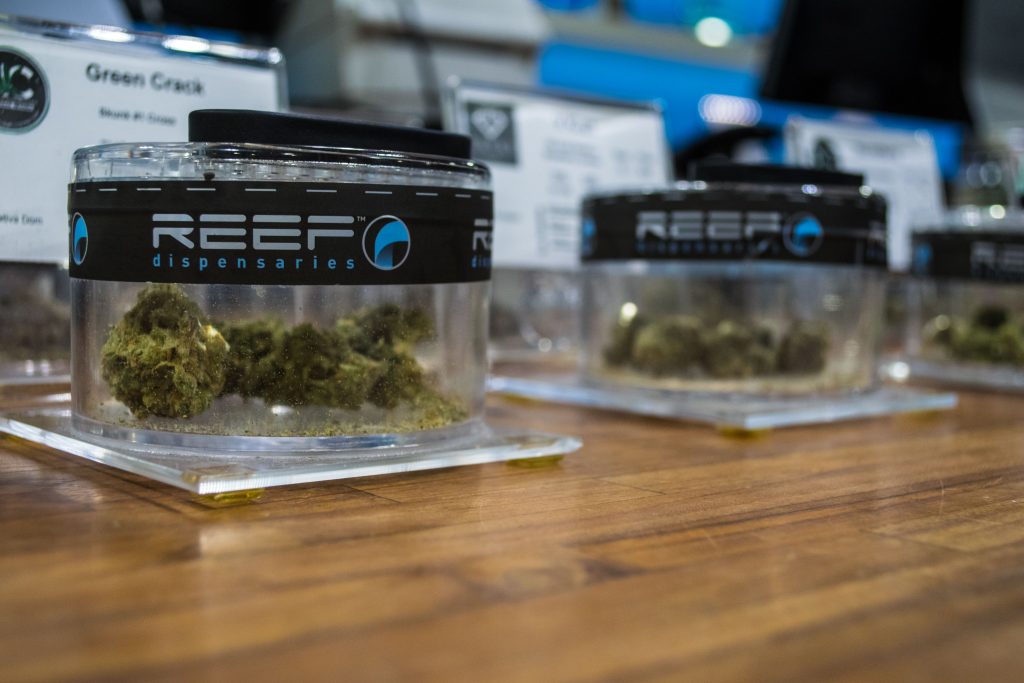
The retail portion of Reef Dispensaries in Las Vegas, NV, photographed during a tour of the facility. (Photo: Daniel Nee/Shorebeat)
A hearing that lasted over four hours and drew impassioned arguments from residents and advocates on both sides of the cannabis legalization issue may have been all for naught.
A review of the bill by several media outlets – including Shorebeat – on Thursday indicates that any ordinance approved by municipalities before the substance is actually legalized would be considered “null and void,” and the township would have to advertise, vote twice and hold another hearing before imposing a prohibition on the sale or cultivation of cannabis.
That possibility only exists if the current bill which could be up for a vote next week passes. Reports Thursday held that the there may not be enough votes in either house of the state legislature to assure passage, though if enough political horse-trading over the weekend pays off, Gov. Phil Murphy would sign the measure into law.
|
|
The text of the bill widely characterizes the “null and void” provision as applying to any ordinance “addressing the issue of prohibiting one or more types of cannabis-related activities” in a given town. Brick officials, earlier this month, approved a bill that prohibits the sale, cultivation, processing and research activities of recreational cannabis. The law calls for the state to create a cannabis regulatory commission to develop policies related to the sale of legal, recreational marijuana. While municipalities will have the opportunity to prohibit sales and cultivation, they would only be able to do so after that commission – whose members would be appointed by the governor and legislature – produce those regulations. At that time only, towns would have the chance to enact ordinances within “180 days following the adoption of the commission’s initial rules.”
Locally, Brick and Point Pleasant Beach have passed prohibition ordinances. In Ocean County, Surf City passed a pre-emptive ordinance as well, and one has been introduced by Seaside Heights, though it has yet to be adopted by way of a final vote after a public hearing.
Only an ordinance to prohibit one or more classes of cannabis establishment enacted pursuant to the specific authority to do so by this section shall be valid and enforceable; any ordinance enacted by a local governmental entity prior to the effective date of this section addressing the issue of prohibiting one or more types of cannabis-related activities within the jurisdiction of the local governmental entity is null and void, and that entity may only prohibit the operation of one or more classes of cannabis establishment by enactment of a new ordinance based upon the specific authority to do so by this section.
Mayor John Ducey long warned that pre-emptive ordinances would not be enforceable, but ultimately concluded – with advice from township attorney Kevin Starkey – that because Brick’s ordinance referenced the specific classes of cannabis-related activities in the proposal, it would stand. The law’s plain language contradicts that, though Ducey on Thursday night told Shorebeat that the ordinance is valid.
“Brick has banned the sale of recreational marijuana, cultivation, testing and manufacturing, so it’s over,” said Ducey.
Brick’s law applies only to the sale and cultivation of cannabis for recreational use, so it would not have an effect on a cultivation center which only services the medical industry. Jersey Shore Therapeutic Health Care is seeking to switch its case from the zoning board to planning board with the hope of opening a cultivation facility at 385 Adamston Road, arguing that farming is a permitted use within the rural residential zone, in which the property is located. Brick’s land use ordinances allow for “traditional” farming uses, which will almost certainly be a bone of contention for a group of neighbors who have hired attorneys to oppose the operation. The matter as a whole could face scrutiny as to whether cultivated marijuana for medical use could find its way to the recreational market, in which case Brick’s ordinance – if it is enforceable – would apply.
But the bill’s language expressly states that ordinances of that type must be passed after legislation legalizing recreational cannabis is signed into law and a regulatory commission publishes rules and regulations for the market.
Brick Shorebeat will update this story if additional information becomes available.











